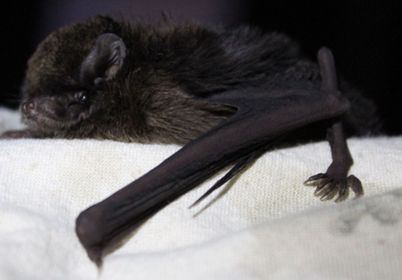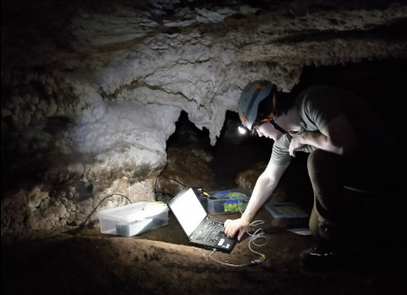Benjamin Sloggett
- MRes Student, Hawkesbury Institute for the Environment, University of Western Sydney
- Topic: Thermal physiology and seasonal energetics of Eastern Bent-winged Bats
- Supervisors: Dr Christopher Turbill and Dr Justin Welbergen
- Collaborating organisations: Western Sydney University, Jenolan Caves and NSW National Parks and Wildlife Service
- Contact: Ben Sloggett
|
Bio:
During my undergraduate degree (Bachelor of Science- Zoology, Western Sydney University, 2014-2016) I developed an interest in animal ecology and ecophysiology. In 2017 I joined the Lab of Animal Ecology and BatsLab at the Hawkesbury Institute for the Environment to conduct my Masters of Research project on torpor and its role in the winter ecology of small mammals. With my project looking at the thermal physiology and seasonal energetics of Eastern bent-winged bats (Miniopterus orianae oceanensis), I hope to uncover more about the hibernation ecology of Australian bats to aid in population and roost management strategies. |

Research:
Many small species of mammals require high mass-specific energy requirements for maintenance, development and thermoregulation. For microbats energy requirements are further increased due to the need to forage through flight. To overcome high energy demands in cold conditions or when foraging success is limited, many species undergo daily torpor or hibernation to reduce energy expenditure.
While research has focused on Australian tree-roosting bats, little is known about Australian cave-roosting species in relation to their thermal physiology.
My research aims to determine the thermal physiology and seasonal energetics of the Eastern bent-winged bat. This obligate cave-roosting species is distributed along the eastern coast of Australia and is listed as vulnerable within New South Wales. Little known about the seasonal patterns in thermoregulation, metabolism and energy expenditure of this species. In this study I will focus on patterns of thermoregulation within wild bats through field telemetry as well as record their metabolic rate, while exposed to variable ambient temperatures through open-flow respirometry.
Many small species of mammals require high mass-specific energy requirements for maintenance, development and thermoregulation. For microbats energy requirements are further increased due to the need to forage through flight. To overcome high energy demands in cold conditions or when foraging success is limited, many species undergo daily torpor or hibernation to reduce energy expenditure.
While research has focused on Australian tree-roosting bats, little is known about Australian cave-roosting species in relation to their thermal physiology.
My research aims to determine the thermal physiology and seasonal energetics of the Eastern bent-winged bat. This obligate cave-roosting species is distributed along the eastern coast of Australia and is listed as vulnerable within New South Wales. Little known about the seasonal patterns in thermoregulation, metabolism and energy expenditure of this species. In this study I will focus on patterns of thermoregulation within wild bats through field telemetry as well as record their metabolic rate, while exposed to variable ambient temperatures through open-flow respirometry.


